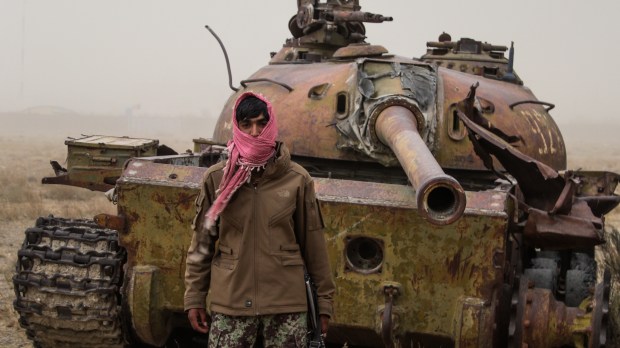Tuesday 22 March 2022
1- Ukraine and the fog of just war criteria
2- Asia in Pope Francis’ new ‘missionary’ Curia
3- Grassroots groups help rescue Holocaust survivors in Ukraine
4- Munich: a Christ in the colors of Ukraine against the war
5- Congo: Pope to celebrate Mass near the site of the ambush of Italian ambassador
~
As the war in Ukraine continues, military intervention – including a no-fly zone – is being discussed in some Western countries. The moral issue of military engagement is complex, says moral theology expert, Kenneth Craycraft, because it invokes the principles of just war. These principles have been challenged by some “plausible arguments” put forward by some theologians who consider that modern weapons and tactics “strain the efficacy” of the criteria. According to the Catechism of the Catholic Church, intentionality is “of supreme importance” in the evaluation of a military intervention, and prohibits any “aggressive war.” For there to be a just war, the damage inflicted by the aggressor must be “lasting, grave and certain,” all other attempts to stop the aggression must have been “impractical or ineffective,” the chance of success must be significant, and the intervention must not cause more harm than those it seeks to eliminate. When dealing with Russia, it is not clear that all these criteria apply, the article explains, especially given the risk of nuclear escalation. “If the NATO countries do not have a clear answer, they should refrain until they do.”
Our Sunday Visitor, English
2Asia in Pope Francis’ new ‘missionary’ Curia
Praedicate Evangelium, Pope Francis’ new Apostolic Constitution not only redesigns the structure and organization of the Vatican dicasteries, but further refocuses on the primacy of the proclamation of the Gospel, urging the Church to a “missionary conversion” and to witness “in word and deed, the mercy which she herself has freely received.” The idea that “the reform must provide for the involvement of lay people, even in roles of governance and responsibility” is very strong. Equally important is the insistence on the “catholicity” of the Roman Curia, that is, the need for it to have the concrete experiences of the churches around the world represented within it. Pope Francis’ desire that his closest collaborators “come from the different regions of the world, so that the Roman Curia reflects the universality of the Church” directly involves Asia, whose people, for the most part, do not know the God of Christians.
Asia News, English
3Grassroots groups help rescue Holocaust survivors in Ukraine
Thousands of miles away from Kyiv, in Los Angeles, Julia Entin is working tirelessly to evacuate Holocaust survivors in Ukraine, as a paralegal working for Bet Tzedek Legal Services. Usually her organization helps connect Holocaust survivors with local services but now they have turned their attention to the war. “These are already survivors of severe trauma and now with this war, they are experiencing that trauma all over again” said Entin, a refugee from the former Soviet Union and granddaughter of a Ukrainian Holocaust survivor. She has been calling survivors in Ukraine usually with a family member or friend on the line. She explains it can be challenging establishing a rapport with older people over the phone and getting them to trust that she is trying to evacuate them safely through pre-vetted transport. Speaking about a man in his late 80s who refused to leave his home, as he was afraid he might die on the way, Entin said “convincing him has been a real challenge because you cannot guarantee — no one can guarantee — that it won’t happen.” Entin’s organization is only one of many that are working around the clock to help vulnerable communities escape from the conflict.
Associated Press, English
4Munich: a Christ in the colors of Ukraine against the war
In the Church of St Maximilian in Munich (Germany) a sculpture to protest the war in Ukraine has been installed. The artwork, made by local artist Harry Seeholzer, features a blue Christ with a yellow loincloth, in the colors of the Ukrainian flag. The work is made out of wood carved from an oak tree and was the centerpiece for a charity concert organized this week by the parish for the victims of the conflict. The parish priest Rainer Maria Schiessler spoke out against the critics who considered the work “populist” and even “blasphemous.” In the face of human suffering and tragedy, he said it was a strong symbol against war: “Christ with his outstretched arms is a figure of prayer. Lord, let this end.”
Cath.ch, French
5Congo: Pope to celebrate Mass near the site of the ambush of Italian ambassador
The government of the Democratic Republic of Congo announced that when Pope Francis visits the country from July 2 to 5, he will celebrate Mass near the place where Italian Ambassador to the country, Luca Attanasio, was killed on Feb. 22, 2021. He will celebrate Mass in the village of Chegera, about 15 km north of Goma where on the Goma-Rushuru road (North Kivu), Ambassador Attanasio was ambushed, together with the policeman of his escort, Vittorio Iacovacci, and their driver Mustapha Milambo. Works have begun in the village to create an area that should be able to accommodate around two million people for the event.
Fides, French

